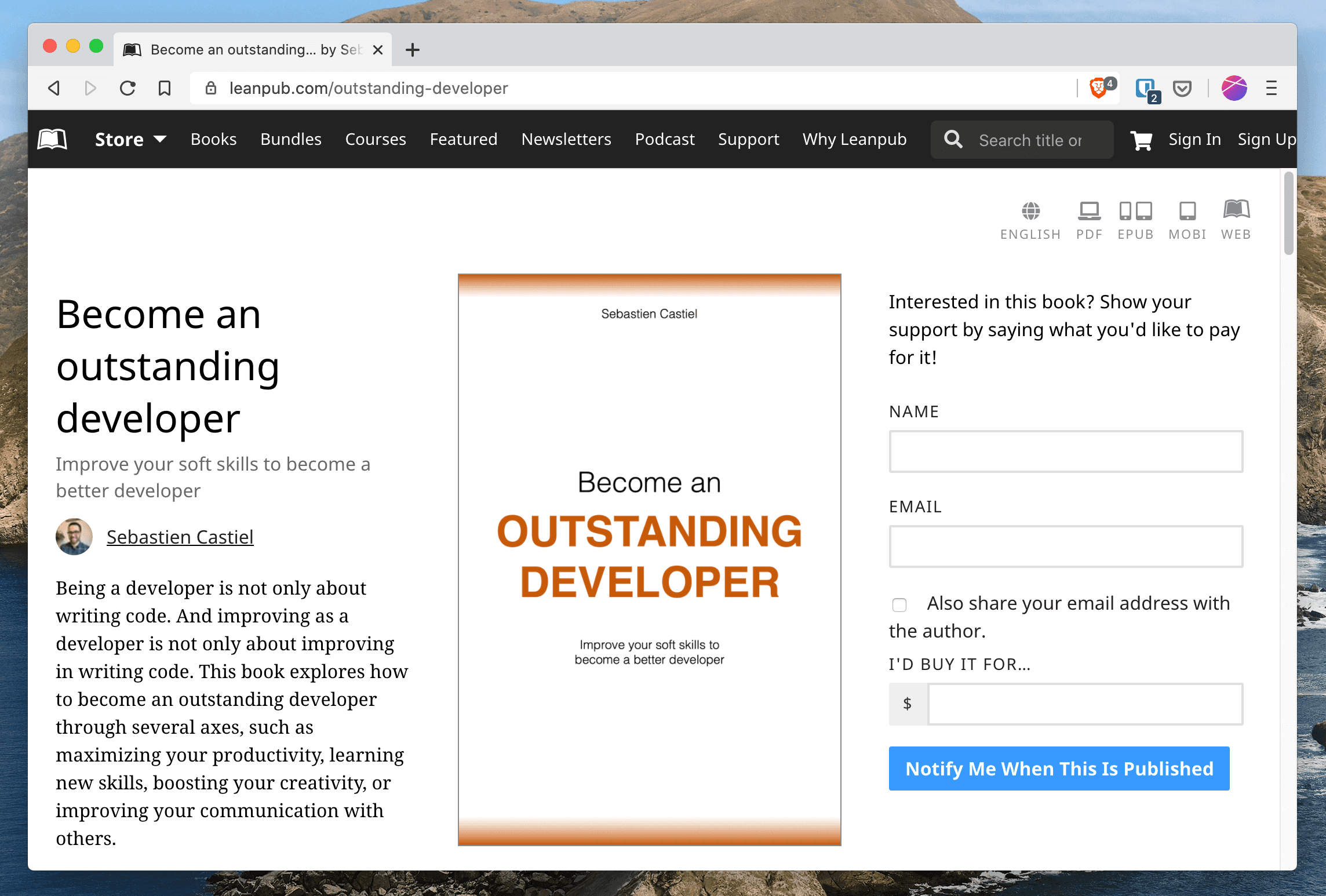I’m writing a new book: Become an Outstanding Developer
Posted on May 12, 2020·
When you’ve been working as a developer for several years, improving at coding is not enough to become better at your job. Of course, it’s a very important thing, but some soft-skills can make you not only better but one of the best. And I decided to accept the challenge: explore them and put them into a book!
TL;DR: Know more about the book and subscribe to updates on its LeanPub page!

A year ago, I finished writing a book in French about React. It was a technical book, a guide to creating web and mobile applications using the framework I’ve been using for a few years. Writing a book is at first very exciting, then very challenging, sometimes very hard, but when you finish, it’s truly awesome. And I guess as with any project taking you a lot of dedication, once you finish you can’t help but think about the next one.
Why this book?
For the last couple of years, I read a lot of books, especially nonfiction ones. About productivity, learning, communication, finance, creativity, etc. And I realized that for most of them, I could apply what they taught me in my daily developer job. Even more, they helped me to get better at it.
Note that I’m not talking about technical books about how to code better, such as Pragmatic Programmer or Clean Code. These books are awesome, and I can’t recommend you enough to read them. Still, there is space for another way to improve as a developer.
With this new book I’ll continue to study books, but also research articles, blog posts, testimonies, and relate them to my personal experiences. I’ll still learn a lot during the writing process I’m sure.
What will be in it?
Right now, I just finished the preliminary research phase, leading to the first draft of a table of contents (and a huge mind map, and a very big list of articles). I can see four big axes to develop, each one of them taking one or to chapters:
- Productivity
- Skills (learning new ones or master the ones you have)
- Creativity
- Communication
Nothing is definitive, I may insert new chapters during the writing process, maybe thanks to suggestions from some readers.

Note that my goal is not to list pieces of advice like “do this” or “don’t do that”. I give a big importance to what is said in the literature (I already spent such a lot of time on Google Scholar), always trying to relate what I find to my own experiences.
In English?
Yep. And it’s a big challenge for me (I’m French). I’m used to writing articles in English, but a book is another story. I’m using Grammarly to avoid some basic mistakes, but I also plan on getting help from a professional reviewer.
Writing process
As for my previous book, I’m using LeanPub to be able to release chapters as soon as they’re ready. This way, readers can send me remarks or suggestions, and make me able to adjust the rest of the book or make corrections. Plus it’s a big motivation to know that some people are expecting the next chapter, however few of them there are.
What’s next?
Well, the next step is obvious: now that I have material, I need to start writing! I expect the first chapter to be available within a month or two. If you’re interested, don’t hesitate to subscribe to updates on the book’s LeanPub page.
If you have suggestions, you can always contact me via e-mail or Twitter (my DMs are open).
See you in a couple of months with the first chapter!
Cover photo by MILKOVÍ.
Check my latest articles
- 📄 13 tips for better Pull Requests and Code Review (October 17, 2023)Would you like to become better at crafting pull requests and reviewing code? Here are the 13 tips from my latest book that you can use in your daily developer activity.
- 📄 The simplest example to understand Server Actions in Next.js (August 3, 2023)Server Actions are a new feature in Next.js. The first time I heard about them, they didn’t seem very intuitive to me. Now that I’m a bit more used to them, let me contribute to making them easier to understand.
- 📄 Intro to React Server Components and Actions with Next.js (July 3, 2023)React is living something these days. Although it was created as a client UI library, it can now be used to generate almost everything from the server. And we get a lot from this change, especially when coupled with Next.js. Let’s use Server Components and Actions to build something fun: a guestbook.
